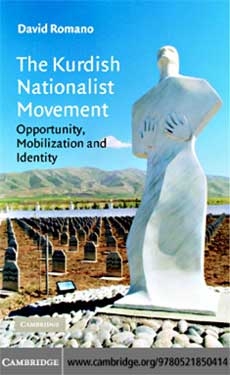| Acknowledgments
I would like to gratefully acknowledge the sources of financial support for my doctoral studies, which form the basis of this book: Quebec’s Fonds pour la Formation de Chercheurs et l’Aide a` la Recherche, the Canadian Department of National Defence Security and Defense Forum Doctoral Scholarship, and the University of Toronto’s Department of Political Science and School of Graduate Studies.
Professor Richard Sandbrook supervised my doctoral studies with diligence, enthusiasm, and a congeniality that always made me look forward to my talks with him. One could not ask for more from a supervisor, and I hope other doctoral students will be as fortunate as I was in this respect. ProfessorAmir Hassanpour also assisted me in ways too numerous to mention (loaning me money for airfare to Teheran was just one of the many examples of his humanity and generosity). His considerable scholarship on the Kurds, nationalism, and language remain an inspiration to me. Additionally, Professor Paul Kingston provided enthusiastic support for my work, giving much needed suggestions for improving the dissertation. His sense of humor and cheerful disposition greatly added to the welcome I felt at the University of Toronto.
Earlier academic influences on me also deserve thanks, particularly professors Rex Brynen and Philip Oxhorn at McGill University. Rex first cultivated my interest in political science enough for me to pursue graduate studies in the subject, and Philip directed that interest towards the social movement theories that became so central to my research.
During the preparation of my doctoral thesis and its subsequent revision into a book, Hadi Elis frequently shared with me his considerable views on the Kurdish issue, as well as articles and other sources on the subject that he has collected over the years. Indeed, if any published source mentions the Kurds in English,Turkish,Kurdish, or even some other language, Hadi is likely to have a copy in his personal library. His help was invaluable and his friendship much appreciated. I am also very much indebted to the help given me byNicole Leaver and Dominika Pawloska,my research assistants during 2003 when I taught political science at McGill University.
Members of the research team I led to Iraqi Kurdistan from October 2003 to May 2004 assisted me in ways too numerous to mention. Lucy Brown, Mike Boag, and Karim Khallayoun’s company and friendship during those eight months have also become priceless, treasured memories. Right up until the final manuscript revisions in Montreal, Lucy continued to provide me with useful comments and help on the work.
Finally, I still feel the need to acknowledge the people this book is about, by including here the original dedication of my Ph.D. thesis: To all those of you who, acting only out of your sense of honor and goodness, were so kind and helpful to someone far from home and, occasionally, in serious difficulty. The hospitality shown to me during my fieldwork in Turkey, Iran, Iraq, Syria, and Kurdistan reminded me that whether we choose to call ourselves Turkish, Persian, Arab, Kurdish, Canadian, citizen,Muslim,Christian, Jewish, worker, owner, peasant, tribal member, man, woman, soldier, freedom fighter, or something else, in the end we are all human. I hope you will judge any shortcoming or errors in this work, for all of which I alone am responsible, forgivingly. |
